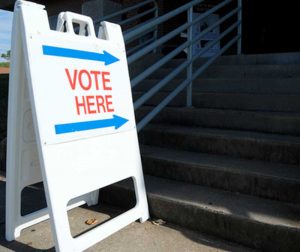UPDATED — Fayette Countians should know within a few days who can run and who can vote in the Sept. 15 special election to fill the District 5 seat on the Fayette County Board of Commissioners.
An hour of oral arguments was heard Thursday afternoon by Judge Timothy Batten in U.S. District Court in downtown Atlanta, after which Batten assured both parties that his decision on whether to grant an injunction regarding the election would come quickly, possibly Friday but more likely Monday.
The relatively small courtroom at the Richard B. Russell federal building was filled to capacity, with a few overflow attendees allowed to sit in the jury box. The crowd in the lobby just outside the 21st-floor courtroom was equal to that inside.
All four current members of the Board of Commissioners – Charles Oddo, David Barlow, Steve Brown and Randy Ognio – were in attendance as well as former commissioner Allen McCarty, who lost to Pota Coston last fall in the District 5 election but was on the board when the NAACP district voting lawsuit was filed.
Coston died July 3 after six months in office. The Fayette County Board of Elections convened July 14 and called for the special election, which its legal counsel stated must by law be held using at-large voting and the 2012 district map, since the 11th Circuit Court of Appeals overturned Batten’s summary judgment in January and ordered the case returned to his court for a future trial. A request for an injunction that would force the election to utilize district voting and the 2014 district map was filed shortly after the election board meeting.
The attorneys for both sides at the injunction hearing mainly reiterated the points made in their briefs filed previously. The plaintiffs’ attorney maintained that they have a “substantial likelihood of success” at trial, which the attorneys for the defendants stated that the opposite was true. They also differed sharply on whether the plaintiffs would suffer “irreparable harm” under the voting system now in place.
Whichever way Batten rules, if he does so as quickly as promised it would likely allow the special election to go on as scheduled. Qualifying is set for Aug. 10-14, and early voting begins Aug. 24.
=====================================
[Earlier online story]
A federal court ruling on the possible injunction to change the Sept. 15 special election for the late Pota Coston’s District 5 seat on the Fayette County Board of Commissioners could come Thursday afternoon.
Attorneys for both sides will present their arguments before Judge Timothy Batten in a 2:30 p.m. hearing July 30 at the Richard B. Russell Federal Building in downtown Atlanta. According to an attorney involved with the case, each side will have a maximum of 30 minutes to present its case.
At stake is the process for selecting Coston’s successor as well as which citizens will be allowed to vote in the special election. The Fayette County Board of Elections voted July 14 to have at-large voting using the 2012 map for District 5, taking the position that current law mandates those aspects of the process.
Batten’s summary judgment last year in the lawsuit brought by the NAACP paved the way for the 2014 election using a new gerrymandered map and district-only voting. A federal appeals court threw that ruling out in January but kept the results of last year’s election intact.
When the three members of the election board cast their votes to call the special election, county attorney Dennis Davenport advised them that the voting process itself was out of their hands as a matter of law.
The plaintiffs in the original lawsuit filed an injunction the next day asking the court to force the election to be conducted as it was last year.
In their court filing, the plaintiffs state that “given the summary judgment and 11th Circuit’s ruling, there is substantial likelihood plaintiffs will succeed on the merits of their claim at trial.” They also maintained in their motion that they “will suffer irreparable harm in the absence of the preliminary injunction” and that it will serve the public interest.”
The county’s response filed Monday states that neither of those points is correct.
The election is being conducted according to the county code provision which the plaintiffs in this case have never challenged, according to the county’s court documents. The county also charged that the plaintiffs failed to meet all the requirements for an injunction to be granted.
The plaintiffs cannot show a likelihood of succeeding on the merits of its case because no evidence has been presented, the county alleges. The original lawsuit is set to go to trial at some point, although the date has not been set.
Rather than the current election process causing harm to the plaintiffs, the county’s position is that an injunction would cause harm to the county and its citizens “in that there will be voter and candidate confusion and the resources already necessarily expended will be wasted,” according to Monday’s court filing.
Qualifying for the special election is scheduled to take place Aug. 10-14. Early voting is set to begin Aug. 24.
The Fayette County Board of Education filed a brief Monday in support of the county’s position opposing the injunction, calling the plaintiffs’ arguments “more a political tract than an effort to match the facts of this case to the controlling principles of law. Insofar as Plaintiffs’ brief purports to address either the law or the evidence expected at trial, it falls short on both counts.”
The brief noted that the plaintiffs seemingly disregard the appellate court’s reversal of the summary judgment and even go so far as to assert that the appellate ruling is somehow an affirmation of their position.
Both the county and the school board noted in their written opinions that they await the opportunity to present substantial evidence at trial in support of their positions, and until that happens the appellate ruling and the existing law must take precedence.












Leave a Comment
You must be logged in to post a comment.